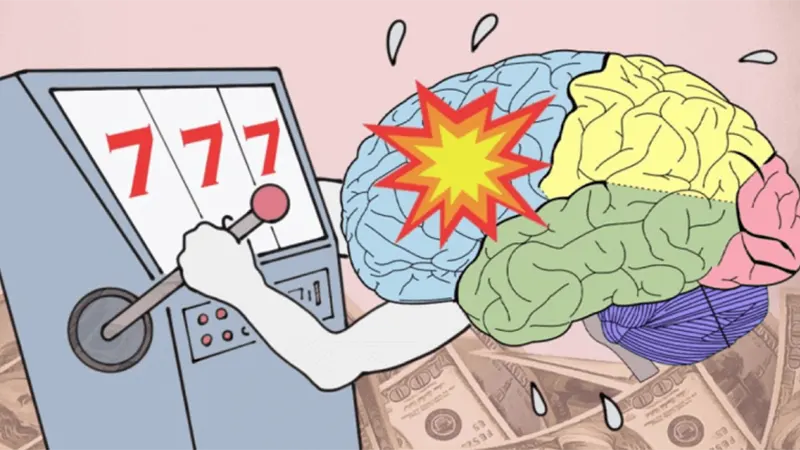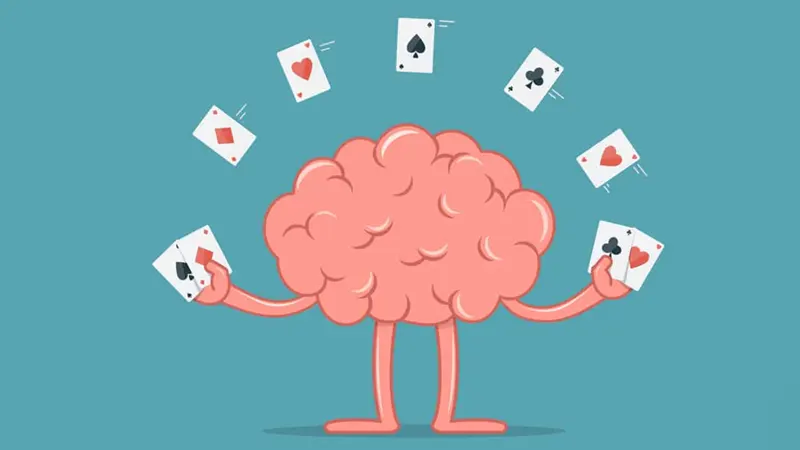Casino environments, whether physical or digital, are meticulously designed to extend playing time and maximize player engagement. What begins as innocent entertainment for many players can quickly evolve into something far more consuming. The sophisticated psychological mechanisms employed by casinos tap into fundamental aspects of human nature, creating experiences that can be difficult to resist.
At 82 Lottery, we’ve witnessed countless players who started with modest entertainment budgets and clear intentions, only to find themselves drawn deeper into extended gaming sessions. This phenomenon isn’t simply about weak willpower or poor decision-making – it’s the result of carefully crafted psychological triggers that exploit natural human responses to reward and risk.
Understanding these psychological mechanisms is crucial for anyone who wants to enjoy casino games responsibly. By recognizing how our brains respond to gambling stimuli and identifying the warning signs of losing control, players can better protect themselves while still enjoying the entertainment value that casino games provide.
Brain Mechanisms and Addictive Elements in Casino Games
The human brain’s reward system plays a central role in gambling attraction. When players win or even come close to winning, the brain releases dopamine, a neurotransmitter associated with pleasure and motivation. This neurochemical response creates a powerful reinforcement mechanism that encourages continued play.
The intermittent reinforcement schedule used in casino games is particularly effective at maintaining engagement. Unlike predictable rewards, random reinforcement creates stronger psychological responses and longer-lasting behavior patterns. This is the same mechanism that makes social media scrolling so compelling – the unpredictable nature of rewards keeps users constantly engaged.
The cycle becomes self-reinforcing: winning generates euphoria and increased confidence, leading to larger bets and extended play. Losing creates frustration and the desire to recover losses, also leading to continued play. This psychological loop can be extremely difficult to break once established, as it operates largely below the level of conscious awareness.
Understanding these neurological responses helps explain why casino games can be so compelling even for players who intellectually understand the mathematical disadvantages. The brain’s reward system doesn’t distinguish between logical understanding and emotional experience – it simply responds to the stimuli it receives.
Psychological Effects That Cause Players to Lose Control
Near-Miss Effect
The near-miss effect is one of the most powerful psychological tools in casino game design. When players come close to winning – such as getting two jackpot symbols with the third just one position away – their brains interpret this as a “near win” rather than a loss. This creates excitement and anticipation that can be more motivating than actual victories.
Research using brain imaging technology has shown that near-misses activate the same neural pathways as actual wins, creating dopamine release and feelings of excitement. This effect is so powerful that it can override rational decision-making and keep players engaged for hours, chasing wins that may never materialize.
Loss Chasing Behavior
Loss chasing is perhaps the most dangerous psychological pattern in gambling. After experiencing losses, players often increase their bet sizes in an attempt to quickly recover their money. This behavior is driven by the emotional pain of losing and the irrational belief that continued play will eventually result in a “balancing” win.

The mathematical reality is that each game outcome is independent, and previous losses don’t increase the probability of future wins. However, the emotional drive to recover losses can be so powerful that it overrides logical thinking, leading to increasingly desperate and risky betting behaviors.
Overconfidence After Wins
Early wins or winning streaks can create dangerous overconfidence. Players who experience success often attribute their wins to skill or special insight rather than luck, leading them to increase bet sizes and extend playing time. This overconfidence can persist even when losses begin to mount, as players convince themselves that their “hot streak” will return.
The psychological boost from winning also creates a sense of invincibility that can override normal risk assessment. Players may abandon their original budgets and strategies, believing that their recent success indicates future wins are likely.
Illusion of Control
Many casino games create an illusion that players can influence outcomes through their choices or timing. Slot machine players often believe they can improve their chances by timing their spins or choosing specific machines. Table game players may think they can predict outcomes based on previous results or develop systems to beat the house.
In reality, most casino games are determined by random number generators or pure chance. The illusion of control is a cognitive bias that makes players feel they have more influence over outcomes than they actually do. This false sense of control can lead to extended play sessions and increased betting, as players believe their “skills” will eventually lead to profits.
Sunk Cost Fallacy
The sunk cost fallacy occurs when players continue gambling because they’ve already invested significant time or money. The logic becomes: “I’ve already lost so much, I have to keep playing to have any chance of getting it back.” This thinking pattern can lead to catastrophic losses as players throw good money after bad.
This psychological trap is particularly dangerous because it can override rational decision-making even when players intellectually understand they’re making poor choices. The emotional investment in recovering losses can become more important than the actual financial consequences of continued play.
Casino Strategies That Exploit Player Psychology
Modern casinos employ sophisticated techniques to maximize player engagement and spending. Sound design plays a crucial role, with winning sounds engineered to trigger dopamine release and create excitement. Even small wins are celebrated with disproportionately enthusiastic audio-visual feedback, making players feel successful even when they’re losing money overall.

Promotional strategies like cashback offers, loyalty points, and “free” play credits create psychological anchors that make players feel they’re receiving value. These promotions often have terms that encourage extended play, ultimately benefiting the casino more than the player.
Interface design in online casinos is particularly sophisticated, with smooth animations, attractive graphics, and user-friendly layouts that minimize friction in the betting process. Balance displays may be subtle or absent, making it easier for players to lose track of their spending.
Real Experience from 82 Lottery
Our observations at 82 Lottery have consistently shown that players who experience the most significant losses share common patterns: they lack predetermined limits, fail to stop when ahead, and view gambling as investment rather than entertainment. These players often start with reasonable budgets but gradually increase their stakes as emotions take control.
Conversely, our most successful players – those who maintain long-term enjoyment without devastating losses – typically exhibit strong self-discipline and realistic expectations. They set clear win and loss limits before playing and stick to them regardless of short-term results. They understand that Gambling Psychology involves recognizing and managing emotional responses rather than trying to predict game outcomes.
We’ve noticed that players who treat gambling as entertainment, similar to paying for a movie or meal, tend to have more positive experiences. They budget appropriately, don’t chase losses, and can walk away when they’ve reached their limits. These players understand that the house edge means long-term losses are mathematically inevitable, but they value the entertainment experience enough to pay for it.
The players who struggle most are those who gamble during emotional distress, under the influence of alcohol, or when trying to solve financial problems. These conditions impair judgment and increase the likelihood of making impulsive decisions that lead to significant losses.
How to Maintain Better Self-Control
The most effective strategy for maintaining control is establishing firm limits before you begin playing. Set loss limits (the maximum you’re willing to lose), win limits (the point at which you’ll stop despite feeling “hot”), and time limits (how long you’ll play). Write these limits down and refer to them regularly during your session.
Never gamble when you’re emotionally distressed, tired, or under the influence of alcohol or drugs. These conditions impair judgment and increase the likelihood of making impulsive decisions. If you’re feeling pressured to gamble or using gambling to escape problems, these are warning signs that professional help might be beneficial.

Educate yourself about the mathematical realities of casino games. Understanding concepts like RTP (Return to Player), house edge, and random number generation can help you maintain realistic expectations and avoid the illusion of control. Knowledge won’t guarantee wins, but it can help you make more informed decisions.
Treat your gambling budget as entertainment expense, not investment capital. Just as you wouldn’t expect to get money back from a movie ticket or restaurant meal, don’t expect to profit from gambling. This mindset shift can significantly reduce the emotional pressure that leads to poor decisions.
Professional Advice from 82 Lottery
Knowledge and discipline are far more important than any betting strategy or “system” you might encounter. No legitimate strategy can overcome the mathematical house edge built into casino games. Claims of “guaranteed winning systems” are either fraudulent or misunderstood, and pursuing them often leads to larger losses.
Focus on understanding the games you play, including their odds, house edges, and psychological elements. This knowledge won’t make you a winner, but it will help you make more informed decisions and maintain realistic expectations. Remember that casino games are designed to be entertaining, not profitable for players.
Always view gambling as entertainment, not as a way to make money or solve financial problems. The most successful gamblers are those who can afford their losses and derive enjoyment from the experience regardless of the outcome. If you find yourself gambling money you can’t afford to lose, it’s time to step back and reassess your approach.
Consider taking regular breaks from gambling, even if you’re not experiencing problems. These breaks can help you maintain perspective and ensure that gambling remains a minor part of your life rather than a central focus. If you find it difficult to take breaks or stick to your limits, this may indicate the need for professional support.
The Path to Responsible Gaming
Casinos are compelling because they tap into fundamental aspects of human psychology, including our responses to reward, risk, and uncertainty. Understanding these psychological mechanisms isn’t about becoming immune to their effects – it’s about recognizing when they’re influencing your behavior and maintaining conscious control over your decisions.
The brain’s reward system, psychological biases like the near-miss effect and loss chasing, and sophisticated casino design all work together to create experiences that can be difficult to resist. However, knowledge of these factors, combined with proper preparation and discipline, can help you maintain control while still enjoying the entertainment value of casino games.
At 82 Lottery, we believe that informed players are better players. By understanding both the mathematical and psychological aspects of gambling, you can make more rational decisions and avoid the common traps that lead to significant losses. Remember that the goal should be entertainment, not profit, and that maintaining control over your gambling behavior is ultimately your responsibility.
Gambling should enhance your life as a form of entertainment, not detract from it as a source of stress or financial hardship. Play responsibly, stay informed about the risks, and don’t hesitate to seek help if you find yourself struggling to maintain control.


